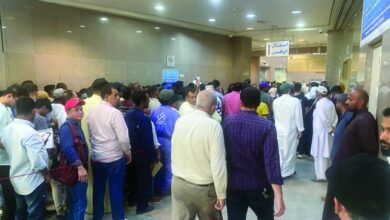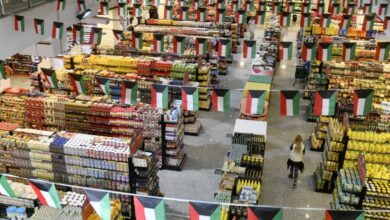Kuwait’s new residency law ensures justice for workers and imprisonment for residency traders

The Assistant Undersecretary of the Ministry of Interior for Residency and Nationality Affairs, Major General Ali Al-Adwani, announced that the First Deputy Prime Minister, Minister of Defense, and Minister of Interior, H.E. Sheikh Fahd Al-Yousef, has directed the formation of a specialized committee to study and determine financial fees for services provided to expatriates, with a proposal to extend the duration of family visit visas to three months.
In an interview on the “60 Minutes” program on Al-Akhbar channel, broadcast last Wednesday evening, Major General Ali Al-Adwani highlighted key amendments to the new foreign residency law, stating that amending and determining fees will be decided by the Minister of Interior, children of Kuwaiti women will be granted a 10-year residency renewable for a similar period and exempted from fees, and penalties for residency trafficking violations have been increased, including imprisonment from 3 to 5 years or fines ranging from 5,000 to 10,000 dinars, along with the closure of violating companies and the cancellation of their licenses.
Keeping up with the latest developments
Al-Adwani stated that the law on the residence of foreigners has been in effect for more than six decades and has only been amended in some simple articles, which were not essential or fundamentally concerned with the citizen and resident. This is one of the reasons that prompted to draft a new law that keeps pace with the developments and changes in our environment.
Al-Adwani added that the Ministry has reached a stage where the foreigners’ residence law has been in effect for a long time without the addition of any new articles. Consequently, the conditions of the past, whether in terms of fees or other aspects, are no longer compatible with the present. This motivated to seek the issuance of a new law concerning resident brothers.
Al-Adwani pointed out that the new law includes several amended articles, newly created articles, and some with only minor changes that will not be focused on, as the main aim is to address those directly concerning citizens and residents. He added that the resident brothers often wonder why the visit duration in Kuwait is limited to only one month. In the new law, the visit duration has been set to three months, with specific fees introduced in alignment with this change.
Al-Adwani continued that another significant change is that the fees have been amended and set with the new law granting the Minister of Interior the authority to amend and determine fees through a ministerial decision. This provision did not exist previously. In the past, any amendment to fees required a change in the law. Today, this process has been streamlined, and fees will be determined by ministerial decision.
Human trafficking
Al-Adwani emphasized that the most important amendments to this law are two newly added articles related to combating human trafficking. Kuwait is not isolated from the world but is part of the global community, with international organizations monitoring actions in addressing human trafficking and residence trafficking.
These articles were introduced to align with international laws to prevent human trafficking and to protect Kuwait from any negative reports by international organizations claiming that Kuwait handles this issue improperly.
Al-Adwani stated that, in the new law, residency periods have been revised and extended for certain groups, including the children of Kuwaiti women, property owners, and investors.
Regarding the children of female citizens, clear instructions are received from the top leadership during the drafting process to facilitate matters for Kuwaiti women.
Importantly, granting the children of Kuwaiti women a 10-year residency will provide societal stability for those citizens. Under the amended law, a female citizen can grant her children a 10-year residency, renewable for a similar period, while exempting them from fees, provided the female citizen is not naturalized under Article 8.
Al-Adwani stated that the children of Kuwaiti women can be exempted from the condition of losing their residency if they are studying or receiving treatment abroad, despite the law stipulating that any expatriate residing outside Kuwait for more than six months will have their residency cancelled.
In this new law, children of Kuwaiti women are exempted from this condition, as they do not need to visit the administration to obtain a leave of absence, and there is no specific time limit for their stay outside Kuwait.
Openness
Al-Adwani explained that, in the new law, reassurance to foreign investors and property owners is provided. Property owners will be granted a 10-year residency by a decision from the Council of Ministers, determining who is entitled to own property in Kuwait.
This residency is aimed at individuals who are settled in Kuwait. Similarly, for investors, a 15-year residency is offered, reflecting global competition to attract investors. This will be done in cooperation with the Investment Promotion Authority, which will determine who qualifies as a foreign investor, demonstrating Kuwait’s openness to the world.
Al-Adwani said that in the past if any particular fee had to be changed, then in that case the law needed to changed. Article 17 of the new law states that ‘all fees related to residency, its renewal, and all types of entry visas shall be determined by a decision from the Minister of Interior.’ This provision did not exist previously, and it addressed the challenges faced in updating fees and laws.
Al-Adwani stated that a committee was formed under the instructions of the Deputy Prime Minister, Minister of Defense, and Minister of Interior, to study the fees, ensuring they are compatible with the income of Kuwait’s expatriates and the services provided to them.
Moreover, if a citizen visits any nearby country with a domestic worker, he pays high visa fees. In contrast, when any Gulf citizen arrives in Kuwait with a domestic worker, currently only 3 dinars are charged. The committee is now working on amending the fees as the current amount is very symbolic.
Reciprocity
Al-Adwani stated that the Ministry of Foreign Affairs has been contacted to provide with the agreements concluded between the State of Kuwait and other countries. It’s not fair for a citizen to visit a country that charges him 70 or 80 dinars as an entry fee, while citizens of these countries enter Kuwait for free. Currently work is underway to ensure that these agreements offer some fairness in dealing between the two parties.
There are countries that Kuwait has exempted from entry fees, and in return, are Kuwaitis exempted from fees in these countries? The Ministry of Foreign Affairs has provided with many agreements, and based on these agreements, the committee will set the fees for citizens of these countries.
Al-Adwani pointed out that an important point is addressed regarding past visits, which were often feared due to violations. Al-Adwani received over 20 messages stating there were 25,000 visit violators, but he was surprised as there was no such issue on the ground. How does a visitor leave Kuwait? Strict rules are set and firm laws on this issue.
Al-Adwani stated that family visits were opened on March 8, 2024, upon instructions from the Deputy Prime Minister, Minister of Defense, and Minister of Interior, H. E. Sheikh Fahd Al-Yousef. Today, there’s no single visit violator; with the number of visits that entered Kuwait, there are no violators, but there were about 4 or 5 violators who were deported with their sponsors.
Human trafficking
Al-Adwani pointed out that regarding combating human trafficking, Article 18 stipulates that it is prohibited to trade in residency by exploiting the recruitment or facilitation of a foreigner’s recruitment under an entry visa or residence permit or its renewal in exchange for sums of money, benefit, or a promise to do so for oneself or for others, whether this recruitment or renewal is for real, fictitious, or alleged work, or employing the foreigner without a license or in violation of the provisions of the Labor Law in the Private Sector or the Domestic Labor Law.
Also, when a foreigner is exploited or his recruitment is facilitated, the employer faces significant penalties. When drafting this article, it was considered that the international organizations and agreements signed by Kuwait to combat human trafficking, and these are measures Kuwait is required to take. Thus, a strict law to deter those facilitating human trafficking is implemented.
Al-Adwani continued that exploiting a person or facilitating his/her residency renewal in exchange for a sum of money is closely linked to obtaining money. Any promise of a financial consideration will lead to punishment as soon as the agreement is reached.
This includes employing someone for the sponsor or for others without a license, which is violation of the law. If the violator does not find anyone to help, he/she will not violate the law. Then one must be more vigilant than the worker himself/herself.
The penalties in this law for violators in the recruitment, employment, or facilitation process are imprisonment from 3 to 5 years, or a fine from 5,000 to 10,000 dinars. This serves as a message to citizens that this matter is not taken lightly. The penalties are severe because the issue is serious, and people must be aware of this.
Double the penalty
Al-Adwani explained that if the violator in the matter of residency is a public employee working within the scope of his job, the penalty is doubled. For example, as the representative of the residency affairs sector, if I facilitated something for myself within the scope of my job, the penalty is doubled.
Al-Adwani stated that he is sending a specific message that any employee involved in this, no matter how simple, if you facilitate human trafficking or assist a violator within the scope of your job, the law will impose a doubled penalty.
This also applies to the legal person, such as the institution or company; the owner will be held accountable for these penalties, and the license will be canceled, with severe accountability measures including company closure. This is a first. Additionally, the penalty is doubled according to the number of violators; if 3 violators are found under one entity, each violator will face separate penalties.
Al-Adwani explained that in the past, workers were not held accountable; all punishments applied to the sponsor. Now, with the new law, if a worker cooperates with a violator, knows about the activity, and participates by paying money, he is punished with one year in prison or a fine of 1,000 dinars. This makes him an accomplice in the crime.
As for Article 18, there is no room for reconciliation, as it’s a strong deterrent due to the damage to Kuwait’s reputation in international forums related to human trafficking and residency issues. Kuwait has put in place a strong law with severe penalties; if one does not engage in these violations, this law does not concern them.
New material
Al-Adwani said that Article 19 is a new addition to the new Foreigners’ Residence Law, which states that the employer or sponsor of a foreigner is prohibited from employing him for any purpose other than what he was recruited for, or enabling or facilitating his work for others without a license from the Ministry of Interior, or refusing to pay his dues without justification. A foreigner is also prohibited from working for others without permission from his government employer or from the competent authorities.
In all cases, others are prohibited from sheltering or employing a foreigner, whether his residency is valid or expired, and they are prohibited from housing him if he does not have a valid residency in the country. Employment for a purpose other than that for which he was recruited is not permissible, as the sponsor is accountable for that. Both the sheltering party and the sponsor are held accountable.
The same applies to housing someone who violates the residency law; if they are not under sponsorship; then do not house them. Citizens must cooperate with the Ministry of Interior and take responsibility within the scope of their sponsorship. The penalties are not simple, and there will be no leniency in enforcing the law. The law as a whole may not work immediately, but its implementation will reflect positively on the country and its reputation.
Al-Adwani pointed out that the approval of this law will reflect the supreme interest of Kuwait, as the law aligns with the requirements that will positively reflect on Kuwait in all aspects. The percentage of violators will decrease with this law due to the deterrent measures it contains, and cooperation from both citizens and residents is necessary.
Highlights of the new changes
No fees for the residency of the children of Kuwaiti women, which is valid for 10 years.
- The residence permit of the son of a Kuwaiti woman will not be cancelled, no matter how long he is abroad.
- 5 years for regular residence.
- 10 years residency for those who own a property.
- 15 years residency for investors.
- 3 months for family visit visa.
- 5 years in prison and 10,000 dinars for the crime of residence trafficking
- One year in prison and 1,000 dinars for the worker involved in the crime of residence trafficking.
Leadership directives to open the country
Al-Adwani confirmed that the Ministry of Interior is trying to reconcile the financial fees with the services provided. It is heading towards opening the country, which is a directive from senior leadership to make entry and exit easier for people, but in return, there must be accountability.
Al-Adwani added, that any resident, who wants, can bring his wife or mother, and some Arab countries are exempt from fees, while some countries charge only 3 dinars for the visa. Here the fees will be arranged according to the service. For example, if anyone wants to visit for a month, then 10 dinars will be charged; for two months, 20 dinars; and for three months, 30 dinars will be charged accordingly. This is just an example, but a final decision is yet to be reached, and the fees will be determined by the committee to be consistent with the service provided.
The law applies to everyone
Al-Adwani explained the steps for the visit visa, saying that there are multiple steps involved. The first step is issuing the visa, and a message comes via the “Sahel” application to the sponsor, stating that the visa has been issued. Before the visit period ends, a notification is sent that there are two days left until the visa expires. If it expires, a new notification comes indicating that it has expired.
These three notifications alert the sponsor, and if they do not pay attention, they are summoned to the Residence Affairs Investigations, where they are informed that they have a visitor who has not left Kuwait.
If they do not visit the Ministry, then they are blocked and all those involved in this violation are deported. This approach shows that there is a law being enforced. It’s an endeavour to open the country with a law that applies to everyone.
3 Rules for Resident Deportation
Al-Adwani stated that the rules for deporting and expelling foreigners from Kuwait are defined by law in three points. The Minister of Interior may issue a decision to deport any foreigner within a specific period, even if they have obtained a residence permit, in the following cases:
- If he has no legitimate source of income.
- If it violates the provisions of Article 19 of the Law.
- If the Minister of Interior deems his deportation necessary for the public interest, public security, or public morals.
Al-Adwani stated that the expenses of deportation will be borne by the employer, or whoever accommodated or sheltered the foreigner. Article 24 of the law allows the Minister of Interior to order that the expenses of deportation be paid from the money of the deportee if they have funds available.
Procedures for regulating domestic workers
Al-Adwani stated that Article 14 on domestic workers tries to facilitate matters for the Kuwaiti sponsor, allowing for stable domestic workers. The residency of a worker leaving Kuwait is canceled after 4 months instead of 6 months, and the sponsor can extend the worker’s absence for more than 6 months if the worker’s residency is still valid through an easy application.
Al-Adwani explained that the law regulates the relationship between the worker and the employer to a great extent, particularly regarding financial dues, so it is necessary to document the receipt of the domestic worker’s salary by any means to preserve rights.
We do not want reviewers in the “residence” departments
Al-Adwani pointed out that the digital transformation has included all sectors of the Ministry of Interior to get rid of paper services and personal visits to the relevant departments, as directed by the Minister of Interior.
There are more than 9 services available online, and no visitor needs to visit the residence centers. The Ministry is working on the (Kuwait Visa) website to take Kuwait to a qualitative leap, with visa approval taking no more than 15 minutes.
A new form for the visa with large security marks will be implemented very soon. Additionally, in the Gulf Cup Championship, there is a (Hayakum) platform linked to (Kuwait Visa).
Source: Al Rai















